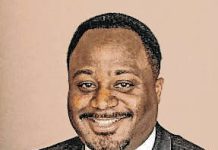Yes: The religious right not to design cake
By Jay Ambrose

Say you are a gay couple and are wonderfully excited because the two of you bought a bakery and are making good money at something you enjoy. One day, however, this guy comes in and wants a cake for a rally against gay marriages. He asks for a design celebrating this event, and you say no sir, we won’t do that, and suddenly you are in legal trouble.
That would be wrong, right? Yes, because, if you had done that, you would have been party to something that goes deeply against your soul, what you believe, what you have fought for, what you think are your rights. After all, how is it that you can be compelled to fashion a beautiful display for something you consider so ugly? The guy happened to be a racial minority, but that’s not why you refused him. In fact, you would happily have sold him any cake in the shop.
But all of that is everyday common sense in tune with American principles, and such arguments have so far failed to work for Jack Phillips in a real-life, non-hypothetical situation.
Phillips is a Denver baker. A couple came into his shop one day and wanted him to design a special cake for their upcoming gay marriage. Phillips is a devout Christian who believes same-sex marriage contradicts God’s will. He gently told the couple he would make a cake for them for other purposes but would not devote his own artistic creativity for a purpose alien to his religious conscience.
The couple got their cake elsewhere and then knocked on the door of the Colorado Civil Rights Commission that quickly decided Philips had no rights. If you are dealing with a gay couple, it said, you’ve got to perform as demanded, and, if you don’t, you are discriminating and will pay. Lower courts said such actions could hinder gay marriage, and the case is now before the Supreme Court.
We will soon learn whether the promises of the Constitution are still being mowed down as unsightly weeds or if the First Amendment — the promise of the government not interfering with free speech — still has a chance. Whatever ideologically driven legalese says, Phillips was discriminating against no one. He was not getting in the way of gay marriage. He was simply saying he would not apply himself personally in expressing sentiments contrary to his idea of what’s right.
This seems perfectly in line with the Supreme Court decision favoring gay marriage. In the written opinion, Justice Anthony Kennedy said that this newly adjudicated right would pose no harm to third parties, that religions would not be forced to applaud something they were against, for instance.
The point is not that we should somehow forget all the torment gays have had to endure over time or somehow foster that, and Phillips was doing no such thing. My own sense is that what we’re seeing here is the leftist doctrine that coercion is the only way to the perfect world they imagine. They might want to note that free speech had an awful lot to do with enabling gays to make the progress they have so notably achieved in a more tolerant America.
Another issue here, of course, is religious freedom. Here is something as vital as vital gets, and no, it doesn’t mean that anything goes. What it means is that even adherents of a faith that promotes loving one’s neighbor should not be forced to abandon it in their daily lives.
Jay Ambrose is an op-ed columnist for Tribune News Service. Readers may email him at [email protected]. Send comments to [email protected].
No: Choose what, not whom, to serve
By Duff Goldman

Since I opened my doors to the public 15 years ago, I’ve made about every cake design that you can imagine. You name it, I’ve probably put it on a cake, or at least been asked whether it was a possibility.
And as a business owner, I know — like most other business owners know — that I can decide what we serve, but not who we serve. I wouldn’t want to do that, anyway.
Unfortunately, there’s an effort underway to give businesses a license to discriminate against LGBTQ people. Recently, the Supreme Court heard the case of Jack Phillips, a conservative baker in Colorado who wants the right to turn away LGBTQ customers. Phillips is being represented by the Alliance Defending Freedom, which spends millions of dollars trying to pass anti-LGBTQ laws and pursue cases like this one. At its heart, Phillips’ lawsuit is about discrimination.
Here’s the thing: If a business is open to the public, it must be open to all. We can have rules, set standards and decide what we offer, but we don’t pick and choose who we will serve. For example, if someone came into Charm City Cakes and asked me to make a lasagna, I can say no, because that’s not what we do.
But we decided a long time ago as a society that it’s fundamentally un-American to decline to serve someone because of who they are. That’s what Phillips and anti-LGBTQ activists are trying to do. And if they succeed, it could have a devastating impact on the LGBTQ community and millions of others who unfortunately still find themselves at heightened risk of discrimination.
Do we want a country where people can be turned away for their race, their religion, their sexual orientation or their gender identity? I don’t — and I don’t think most Americans do, either. We’ve had this national conversation before, and we shouldn’t have to force our LGBTQ friends and neighbors to relive it now.
The bottom line is this: It’s my job to make my customers happy — not to tell them how they should be living their lives. While I’ve had dilemmas about design requests in the past, it’s always been about ensuring my customer gets the best possible product, not because of the person ordering it.
I also understand that by providing a cake to someone, it doesn’t mean I endorse everything about that person. I don’t make people fill out a survey about all of their opinions and beliefs before agreeing to sell them a cake, and it would be pretty bizarre if I did. Also, all that paperwork sounds like a nightmare!
I’m grateful to be able to serve a community as vibrant, diverse and resilient as Baltimore. The city is a microcosm of our country: a scrappy place full of folks from all different walks of life. It’s taught me everything I know — including how to accept that other people have different beliefs. But, if someone’s beliefs are used to discriminate, that’s something I can’t accept.
Listen, as a baker, I understand the pride that Phillips most likely has in his business, in his designs. I share these values and that pride in what I do. And, if Jack Phillips is ever in Baltimore, I’d be happy to make him a cake and talk this over. He’s certainly entitled to his beliefs — but not to making anyone else less equal in our society.
Let’s hope the Supreme Court agrees.
Duff Goldman is the owner of Charm City Cakes; Twitter: @duffgoldman. He wrote this for the Baltimore Sun. Send comments to [email protected].




